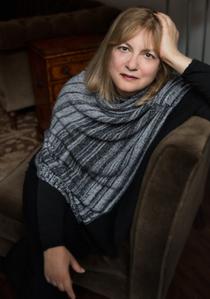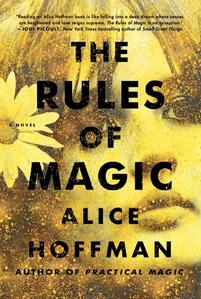
|
|
| photo: Deborah Feingold | |
Alice Hoffman is the author of more than 30 novels for adults, three books of short fiction and eight books for children and young adults. Her 1995 novel Practical Magic is a cult classic, and was made into a film starring Nicole Kidman and Sandra Bullock. Hoffman revisits its central characters, the Owens family, in her new novel, The Rules of Magic (reviewed below; trailer here).
What made you decide to return to the story of the Owens family, 20 years after Practical Magic?
Ever since Practical Magic came out, readers have kept writing to me and saying they wanted more. I found myself wanting more, too. I'm always interested in people's history and pasts, and trying to figure out what made them become the people they were. With the older people in your life, I find, you can never really know them as they were when they were young. And so I wanted to go back and explore the history of the Owens family in a slightly earlier time.
I have been writing bits and pieces related to Practical Magic for 15 years, and it was so easy for me to return to that world. When I started writing The Rules of Magic, I reread Practical Magic because I hadn't reread it for so long. But this book was different. There are so many new characters, a different setting. It was such a pleasure to get back into that world.
Plus, it's the 1960s in New York City--my favorite time period! I lived through it, and I was there (I'm a New Yorker). I love that time period: culturally, socially, artistically. Everything about it is just so rich. And it's kind of the perfect time for these characters, for experimenting with things: mysticism, magic, music. There's also a sense of both past and present in that neighborhood [Greenwich Village]. When I go there now and I walk through the places where Franny and Jet go, I have a sense that the story could be happening now.
There is a sense in the book of both time and timelessness: it's tied to a particular time and place, but the characters and their struggles resonate now.
I want my books to feel timeless, even though they are tied to a particular time and place. I think there are also a lot of echoes between that time and the present day, about what's happening politically and culturally. The 1960s were such an unsettled time, but there was also a real openness to trying new things--to trying to make the world different, and better.  The magic the characters use is a kind of everyday alchemy: there's an understanding that magic is already here in our world, and they can channel it or avoid it via certain "rules." Tell us about your concept of magic and magical power.
The magic the characters use is a kind of everyday alchemy: there's an understanding that magic is already here in our world, and they can channel it or avoid it via certain "rules." Tell us about your concept of magic and magical power.
I'm interested in everyday magic: magic that you could turn a corner and find. I think a lot of that has to do with the books I read as a child, because those are the books that make you a writer. I loved Ray Bradbury's books, and there's a real sense of that everyday magic in the here and now. That's what I'm interested in both as a reader and a writer: magic that is affected by the everyday.
Also, for me, the magic arises in the writing of the book. I knew I was writing about a family of witches, and I did a lot of research: herbal remedies, folk remedies, that sort of thing. But then the real magic comes in the writing of it, and I can't quite explain how that happens.
Courage is a thread that runs through the book: choosing courage over caution, being brave above all. How does courage relate to magic?
In a certain sense, the characters discovered this thread on their own. The book is really all about courage: the courage it takes to be different, the courage it takes to be in love, and the courage it takes to be human. Most people spend their lives running away from all that. The characters have to learn that. It takes Franny a long time to believe that she can be in love, with the consequences it carries, or to admit that she has been in love for a long time. Her sister Jet, who is shy and quiet, is much more able to choose love as a young person. So in a way, the woman who declares herself to be brave takes longer to come into her own than the sister who appears more timid on the outside.
The book deals with destiny and choice: the characters try to dodge a family curse, and they wrestle with accepting fate versus making their own choices. Can you talk about that?
That's a big question. But it's central to the book: the idea of the curse, which affects whether and how the Owens women fall in love. And yet, if you love someone, and open your heart to them, they will ultimately break your heart, curse or no curse. They may betray you; they may not be who you thought they were. Or they may get sick and die, as ultimately we all do. At some point, inevitably, there is pain involved with love. I think it's a big leap to make, and people are very brave when they do it. Part of the Owens "curse" is just being human. And along the way, there are beautiful, wonderful things, and that's part of being human too: such joy. --Katie Noah Gibson, blogger at Cakes, Tea and Dreams

